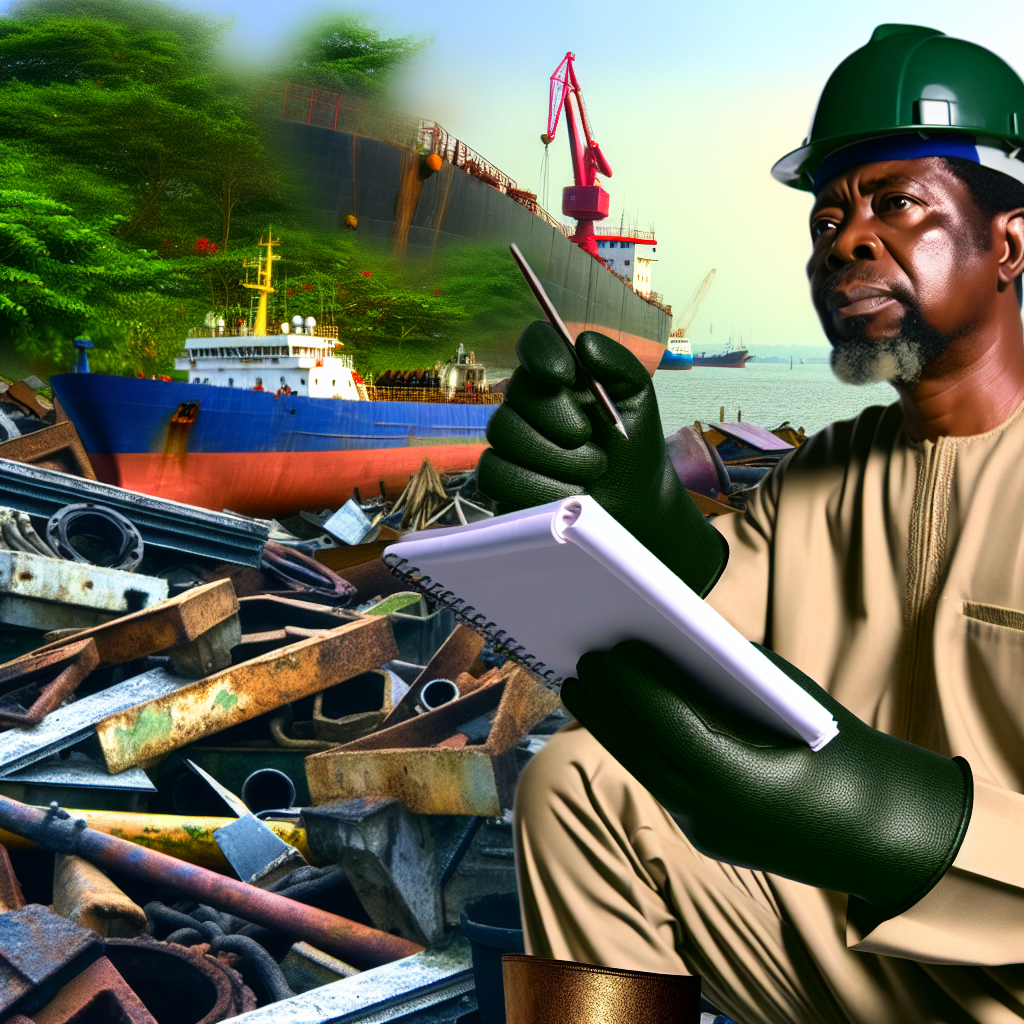Introduction:
Ship Building in Nigeria: Ship building in Nigeria refers to the construction of ships, boats, and marine vessels within the country.
Significance: Ship building plays a crucial role in Nigeria’s economy by fostering trade, supporting maritime activities, and creating job opportunities.
Main Focus: Environmental Impact
Contribution to Pollution: The ship building industry in Nigeria contributes to air, water, and noise pollution due to the use of hazardous materials and heavy machinery.
Deforestation: The demand for timber used in ship construction leads to deforestation, causing habitat loss and disrupting the ecosystem.
Waste Generation: Ship building generates a significant amount of waste, including scraps, chemicals, and byproducts, which pose a threat to the environment.
Oil Spills: Accidental oil spills during ship building operations can contaminate water bodies, affecting marine life and coastal communities.
Adverse Effects on Marine Life: The noise and vibrations from ship building activities can disturb marine animals, leading to consequences on their behavior and survival.
While ship building is essential for economic growth, it is crucial to address and mitigate its environmental impacts to ensure sustainable development in Nigeria.
Overview of Ship Building Industry in Nigeria:
The ship building industry in Nigeria has a long history.
It dates back to the colonial era.
Today, it is a key sector contributing to the country’s economy.
History and Current Status:
- The history of ship building in Nigeria can be traced back to the 19th century when colonial powers established shipyards in the coastal areas.
- Currently, Nigeria boasts several shipyards along its coastline, supporting both commercial and military ship building operations.
- Despite facing challenges like infrastructure deficits and regulatory issues, the industry continues to thrive with a focus on local content development.
Key Players in the Industry:
- Notable players in the Nigerian ship building industry include the Nigerian Navy Dockyard, Nigerian Maritime Administration and Safety Agency (NIMASA), and private companies like Nigerdock.
- These key players collaborate with international partners to acquire technical expertise and improve ship building capabilities in Nigeria.
- The involvement of these stakeholders has led to the construction of various types of ships, including patrol vessels, offshore support vessels, and barges.
Types of Ships Being Built in Nigeria:
- Patrol Vessels: These are used for maritime security operations, surveillance, and control of Nigeria’s territorial waters to combat piracy and illegal activities.
- Offshore Support Vessels: These specialized ships are designed to support offshore oil and gas operations, transporting crew, equipment, and supplies to drilling platforms.
- Barges: Barges are flat-bottomed vessels used for transporting heavy cargo, dredging operations, and construction projects in Nigeria’s waterways.
Environmental Regulations in Nigeria:
Existing environmental regulations related to ship building:
- The National Environmental Standards and Regulations Enforcement Agency (NESREA) oversees environmental regulations.
- The Merchant Shipping Act regulates ship construction, operation, and disposal of waste.
- The Environmental Impact Assessment (EIA) Act requires environmental assessments before ship building projects.
The effectiveness of these regulations in protecting the environment:
- The regulations aim to minimize the environmental impact of ship building activities.
- EIAs help identify potential risks and suggest mitigation measures.
- The Merchant Shipping Act ensures proper waste disposal to prevent marine pollution.
Challenges or loopholes in the enforcement of these regulations:
- Inadequate enforcement capacity and resources hinder effective monitoring and compliance.
- Corruption and lack of transparency may lead to regulatory violations.
- Inconsistent implementation of regulations across different regions and industries.
While Nigeria has established environmental regulations to govern ship building activities, challenges in enforcement and compliance need to be addressed for better environmental protection.
See Related Content: Animal and Environmental Biology Student Experiences
Pollution from Ship Building Activities:
Ship building activities in Nigeria contribute to various forms of pollution.
These activities impact the environment significantly.
Identifying the main sources of pollution from ship building is crucial.
This understanding helps in grasping the extent of the problem.
- Waste Discharge: One of the primary sources of pollution is the discharge of various waste materials into water bodies during the construction process.
- Air Emissions: Ship building operations also release emissions such as volatile organic compounds, particulate matter, and other pollutants into the air.
- Chemical Spills: Accidental spills of chemicals and fuels used in ship construction can contaminate water sources and soil in the surrounding areas.
The impact of these pollutants on the environment is significant and far-reaching.
The release of waste materials, chemicals, and emissions can have detrimental effects on ecosystems, aquatic life, and human health.
For example, the discharge of waste materials like heavy metals and oils into water bodies can lead to water pollution.
This affects marine organisms and disrupts the balance of aquatic ecosystems.
Chemical spills can contaminate soil, making it unsuitable for agriculture and other land uses.
Some specific incidents have highlighted the severity of pollution from ship building activities in Nigeria.
For instance, the contamination of the Ogoni region in the Niger Delta due to oil spills from ships and other sources has had a devastating impact on the environment and the local communities.
Additionally, areas around major ship building yards in Lagos and Port Harcourt have reported increased levels of pollution.
This pollution impacts the health and well-being of residents living nearby.
These incidents serve as stark reminders of the urgent need to address pollution from ship building activities in Nigeria.
Addressing the sources of pollution from ship building activities in Nigeria is a pressing environmental issue.
This situation requires immediate attention and action.
Identifying the main sources of pollution and understanding their impact is crucial.
Mitigating the negative effects on the environment and protecting the health of communities living in the vicinity of ship building yards is essential.
See Related Content: Chemical Engineering vs. Chemistry Degrees
Environmental Impacts of Ship Building in Nigeria
One major environmental impact of ship building in Nigeria is the deforestation and habitat destruction caused by these activities.
Deforestation
Ship building activities in Nigeria contribute to deforestation by requiring large amounts of timber for construction.
Trees are logged from forests to supply the wood needed for building ships, leading to deforestation.
Deforestation can have negative effects on the environment, such as soil erosion and loss of biodiversity.
The loss of trees also reduces the capacity of forests to absorb carbon dioxide, contributing to climate change.
Transform Your Career with Expert Guidance
Get personalized mentorship consulting that’s tailored to your unique path. Our expert advice is actionable and exclusive.
Get StartedHabitat Destruction
Ship building activities not only cause deforestation but also lead to the destruction of habitats for wildlife.
As forests are cleared for timber, the natural habitats of many species are disrupted or completely destroyed.
Wildlife populations may decline or become endangered due to the loss of their natural habitats.
Mangrove forests, in particular, are vital habitats that are often destroyed for ship building activities.
Conservation Efforts
To address deforestation and habitat destruction, some initiatives and conservation efforts have been put in place.
One such initiative is the establishment of protected areas and wildlife reserves to conserve natural habitats.
Reforestation projects are also implemented to restore forest areas that have been cleared for ship building.
Sustainable forestry practices, such as selective logging and tree planting programs, help to mitigate deforestation.
Explore Further: Agricultural Economics Journals in Nigeria

When it comes to waste management and disposal in the ship building industry in Nigeria, there are several critical issues that need to be addressed.
The process of ship building generates a significant amount of waste, much of which has the potential to harm the environment if not properly handled.
Issues Surrounding Waste Management
One of the primary issues surrounding waste management in the ship building industry is the lack of proper infrastructure and regulations in place to handle the volume and variety of waste produced.
This often leads to haphazard disposal methods that can have serious consequences for the environment.
Furthermore, the lack of awareness among stakeholders about the importance of proper waste management and the potential environmental impacts of improper disposal practices exacerbates the problem.
Without a clear understanding of the consequences of their actions, individuals may be more likely to turn a blind eye to or participate in illegal waste disposal practices.
Types of Waste Generated
During the ship building process, several types of waste are generated, including but not limited to:
- Metal scraps and shavings
- Chemical residues and solvents
- Paints and coatings
- Plastic materials
- Electronic waste
These various types of waste each pose their own environmental risks if not disposed of properly.
Metal scraps and shavings, for example, can leach harmful metals into the soil and water, while chemical residues and solvents can contaminate the air and water sources.
Methods of Waste Disposal and Environmental Impacts
There are several methods of waste disposal commonly used in the ship building industry, each with its own environmental impacts:
- Landfill Disposal: This is a common method of waste disposal where waste is buried in landfills. While this helps keep waste out of sight, it can lead to soil and groundwater contamination if the landfill is not properly lined and managed.
- Incineration: Incineration is another method used to dispose of waste by burning it. While this can reduce the volume of waste, it can also release harmful pollutants into the air if not monitored and regulated properly.
- Recycling: Recycling is a more sustainable method of waste disposal that involves reusing materials to create new products. This helps reduce the need for virgin resources and minimizes the environmental impact of waste disposal.
- Waste Minimization: Waste minimization involves reducing the amount of waste generated in the first place. This can be achieved through better planning and design processes that prioritize sustainability and reduce the overall environmental impact of ship building.
Overall, the methods of waste disposal used in the ship building industry in Nigeria have a direct impact on the environment.
It is crucial for stakeholders to prioritize sustainable waste management practices to minimize the environmental footprint of ship building activities and protect the local ecosystems for future generations.
Learn More: Bioinformatics Education Programs in Nigerian Universities
Alternative Practices and Sustainable Solutions
When it comes to minimizing the environmental impact of ship building in Nigeria, there are several alternative practices and sustainable solutions that can be adopted.
These strategies aim to reduce pollution, conserve resources, and promote a more eco-friendly approach to ship construction.
Let’s explore some of these options:
- Utilization of Eco-friendly Materials: Instead of traditional materials that can harm the environment, using sustainable and recyclable materials can help minimize the ecological footprint of ship building.
- Adoption of Green Technologies: Implementing innovative technologies such as solar panels, wind power, and hybrid engines can significantly reduce greenhouse gas emissions and energy consumption.
- Integration of Green Design Principles: Incorporating green design principles in ship building can enhance energy efficiency, increase operational performance, and decrease environmental impact.
- Implementation of Waste Management Practices: Proper waste management techniques, including recycling, reusing materials, and reducing waste generation, are essential for sustainable ship building practices.
- Investment in Renewable Energy Sources: Investing in renewable energy sources like solar, wind, and hydroelectric power can help in powering ships with minimal environmental impact.
- Embracing Sustainable Ship Building Standards: Following international standards for sustainable ship construction can ensure compliance with environmental regulations and reduce negative effects on the ecosystem.
By adopting these alternative practices and sustainable solutions, the ship building industry in Nigeria can benefit in several ways:
- Reduction of Carbon Footprint: Implementing eco-friendly technologies and practices can lower greenhouse gas emissions, contributing to a healthier environment.
- Conservation of Natural Resources: Using sustainable materials and energy sources can help in conserving natural resources and preserving biodiversity.
- Cost Savings: Sustainable solutions may initially require investment, but in the long run, they can result in cost savings through reduced energy consumption and waste management expenses.
- Enhanced Reputation: Embracing sustainable ship building practices can improve the industry’s reputation, attract environmentally conscious customers, and create a competitive edge.
- Compliance with Regulations: Following sustainable ship building standards ensures compliance with environmental laws and regulations, avoiding fines and penalties.
There are successful case studies and initiatives worldwide that promote sustainable ship building practices, showcasing the positive impact of these approaches.
- Green Shipbuilding Practices in Norway: Norway has been a pioneer in promoting green ship building practices, with a strong emphasis on using eco-friendly materials and technologies.
- Zero-Emission Ships in Japan: Japan has introduced zero-emission ships powered by hydrogen fuel cells, setting a new benchmark for sustainable ship construction.
- European Union’s Emission Reduction Targets: The EU has set ambitious emission reduction targets for the shipping industry, encouraging the adoption of sustainable solutions and green technologies.
- Collaboration with Environmental Organizations: Many ship building companies are partnering with environmental organizations to develop and implement sustainable ship building initiatives.
- Recognition through Awards and Certifications: Companies that excel in sustainable ship building practices often receive awards and certifications for their commitment to environmental stewardship.
Embracing alternative practices and sustainable solutions in ship building can lead to a greener and more responsible industry in Nigeria.
By prioritizing environmental protection, conserving resources, and complying with regulations, the ship building sector can contribute to a cleaner and healthier planet for future generations.
Environmental Impact of Ship Building in Nigeria
Ship building in Nigeria has significant environmental impacts.
These impacts include air pollution from emissions.
Water pollution arises from untreated waste.
Additionally, sourcing materials leads to deforestation.
It is imperative that these environmental concerns are addressed.
Prompt action can mitigate the long-term effects on the ecosystem and public health.
Stakeholders must prioritize sustainable practices in the ship building industry.
This includes ship builders, government agencies, and environmental organizations.
By incorporating eco-friendly technologies, the industry can improve its footprint.
Proper waste management and adherence to regulations are crucial.
These actions will contribute to a healthier environment for all.
Additional Resources
Oil, fisheries and coastal communities: A review of impacts on the …
Examining the causes and impacts of pipeline disasters in Nigeria




